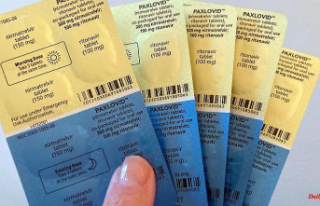Germany is preparing for a possible energy crisis. Success has already been achieved with gas storage facilities. But Saxony-Anhalt's Economics Minister Schulze warns of a false sense of security - and sees the federal government as unanswered to the central question.
A report from the weekend should actually spread confidence in view of the impending gas bottlenecks: the German gas storage facilities are already surprisingly full. According to Federal Network Agency head Klaus Müller, they are already more than 75 percent full - well before the actual target date of September 1st. But Saxony-Anhalt's Economics Minister, Sven Schulze, warned of a false sense of security with regard to gas storage levels: "If Putin turns off the tap completely or the winter gets colder, this won't be enough."
According to legal requirements, the storage tanks must be 85 percent full from October and 95 percent full by November 1st. The filling of the storage facility is a building block to ensure that the gas flow does not dry up in Germany in the winter when Russian deliveries are further reduced or completely canceled. Other factors include gas deliveries from other countries, for example via LNG terminals, and savings in gas consumption of 15 to 20 percent. On Monday it will also be announced how high the gas levy will be, which is intended to relieve gas importers.
And Russia is still pumping natural gas to Germany. For more than two weeks, however, the important Baltic Sea pipeline Nord Stream 1 has only been utilized at around 20 percent. According to Schulze, however, the federal government has not answered the central question: "Where will the gas come from in autumn and winter when Russia turns off the tap?" This is much more important than filling the gas storage tanks and the question of the gas levy. So far, nothing has come of supply contracts with gas exporters like Qatar. "My biggest concern is that the federal government will not be able to ensure sufficient deliveries," said Schulze. Chancellor Olaf Scholz will travel to Norway on Monday, one of Germany's main gas suppliers.
Schulze called for the federal states to have a say in the distribution of fuel in the event of a gas shortage in winter. "It cannot be that the federal government or the Federal Network Agency alone decides who will no longer get gas in a crisis," said the CDU politician. The state government of Saxony-Anhalt is planning a crisis summit with companies for Tuesday. The federal government also wants to present austerity measures on Tuesday.
In the case of the gas levy, Minister Schulze, like Chancellor Scholz before him, advocated the lowest possible value. "The lower it is, the better," he said. The gas levy should be between 1.5 and 5 cents per kilowatt hour. It is intended to stabilize gas importers who have gotten into difficulties, take effect from October 1st and end on April 1st, 2024. Federal Finance Minister Christian Lindner from the FDP meanwhile asked the EU Commission to be able to waive VAT in the gas levy.
In order to secure Germany's energy supply in winter, the economics and transport ministries also presented an ordinance that may give priority to the transport of important goods for the energy supply by rail. Because of the low and further falling water levels, for example on the Rhine, there is a risk that deliveries to power plants and companies by water will be cancelled. Therefore, a regulation should ensure priority transport by rail.












